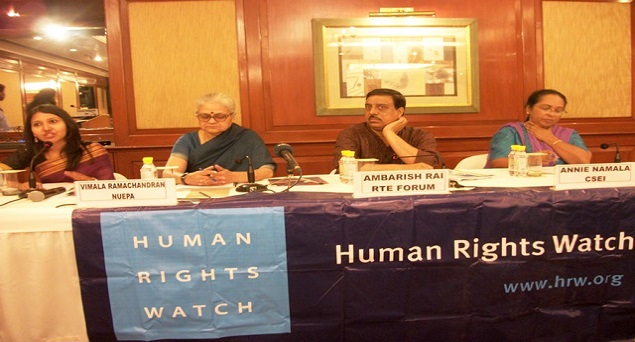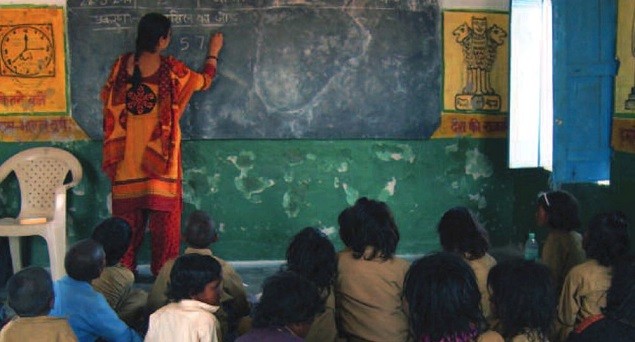By Abu Zafar, India Tomorrow,
New Delhi, 22 April 2014: Children are being discriminated on the basis of their socio economic background, caste and religion in schools of India, international human rights organization Human Rights Watch (HRW) claimed on Tuesday.
In its 77-page report ‘They Say We’re Dirty’: Denying an Education to India’s Marginalized’ HRW talks about discrimination of children belong to marginalized communities like Dalit, Tribal and Muslims.
“The discrimination creates an unwelcome atmosphere that can lead to truancy and eventually may lead the child to stop going to school. Weak monitoring mechanisms fail to identify and track children who attend school irregularly, are at risk of dropping out, or have dropped out,” a statement of HRW reads
Jayshree Bajoria, HRW’s South Asia researcher and author of the report, said that due to discrimination environment of schools is not children friendly.
“Majority of children who are discriminated in schools belongs to economically and socially backward class and discrimination there is nothing called children friendly in our schools,” while addressing a press gathering at the launch of the report on Tuesday in New Delhi, Bajoria said.
“There are several kind of discriminative behaviour by the teacher like ignoring some students, teaching only frontal row of class or children being make sit to back of the class.”
The report also said teachers force student to clean toilet, call them dirty and ask them to sit in corner of classroom.
Bajoria said that due to such behaviour of teachers children leave school and never turn up.
Accusing the government for not tracking those children who leave education in mid-way and said there is no definition of ‘dropout’ throughout the country.
According to the government over 80 million children – drop out before completing their elementary education.
HRW said that it conducted research in Andhra Pradesh, Uttar Pradesh, Bihar, and Delhi and interviewed more than 150 people including children, parents, teachers, education experts and local authorities.

HRW officials releasing the report on 22 April 2014 at India Habitat Centre, New Delhi
“Children from Dalit, tribal, and Muslim communities are often made to sit at the back of the class or in separate rooms, insulted by the use of derogatory names, denied leadership roles, and served food last. They are even told to clean toilets, while children from traditionally privileged groups are not,” the report reads.
HRW quoted a 14-year-old boy from Uttar Pradesh telling teacher throw key on them when she angry.
“The teacher always made us sit in a corner of the room, and would throw keys at. We only got food if anything was left after other children were served.”
A 10 year Muslim boy from Delhi also complains discrimination.
“Whenever the teachers are angry, they call us Mullahs. The Hindu boys also call us Mullahs because our fathers have beards. We feel insulted when they refer to us like this.”
A Dalit boy in Bihar stated that teacher asked him to massage his legs and clean toilet.
“We were asked to massage a teacher’s legs. If we refused, he used to beat us. There was a toilet for teachers, which is the one we had to clean.”
HRW asked government to create a system to monitor and track every child from enrollment till completion of elementary education.
“India’s political parties focused on education during the election campaign,” Bajoria said. “But whoever takes office will need to do more to ensure that children attend classes. An important law is set to fail unless the government intervenes now,” the report further reads.
Ambarish Rai of RTE Forum alleged that no political party is committed to implement RTE act seriously in its own state.
He also said that less than 10 percent schools across the country have all RTE compliance.
He said that apart from discrimination in schools there is sense of discrimination in policy as well.
“There are discriminations on policy level also. More resources are allocated Kendriya Vidyalayas and fewer budgets to other schools. More budget for state like Kerala and Himachal Pradesh and less budget for states like Bihar.
Annie Namala of Centre for Social Equity and Inclusion asked common people to raise this issue in their own level.
“The larger society should have to take call. School becomes first place where children recognize discrimination. They realize that they are different from others,” she concluded.
Recommendations to Government:
— Take steps for the effective implementation of the Right to Education Act that focus not simply on enrollment, but on the retention of every child in school at least until age 14.
— Develop clear standards for monitoring children at risk of dropping out, and develop mechanisms to ensure relevant authorities undertake social mapping, especially in marginalized communities, engage with minority communities, and intervene to ensure that children who have left school can return.
— Develop clear indicators to improve the detection of and response to discrimination in schools. The National Commission for Protection of Child Rights should develop guidelines to address discrimination and other abuses of children, and set out appropriate disciplinary measures.
— Direct the Ministry of Human Resource Development to implement the recommendations on ending discrimination in schools proposed by the National Advisory Council’s Working Group on the Right to Education Act on ending discrimination in schools. These include developing an “equality index” that sets down “monitorable norms and benchmarks to assess the degree of inclusiveness, diversity and equality in schools,” using parameters such as participation, attendance, and classroom practices.
Full Report
http://www.hrw.org/sites/default/files/reports/india0414_ForUpload_1.pdf





